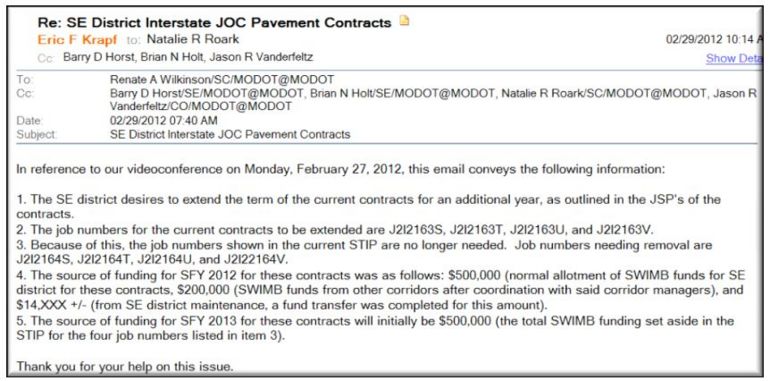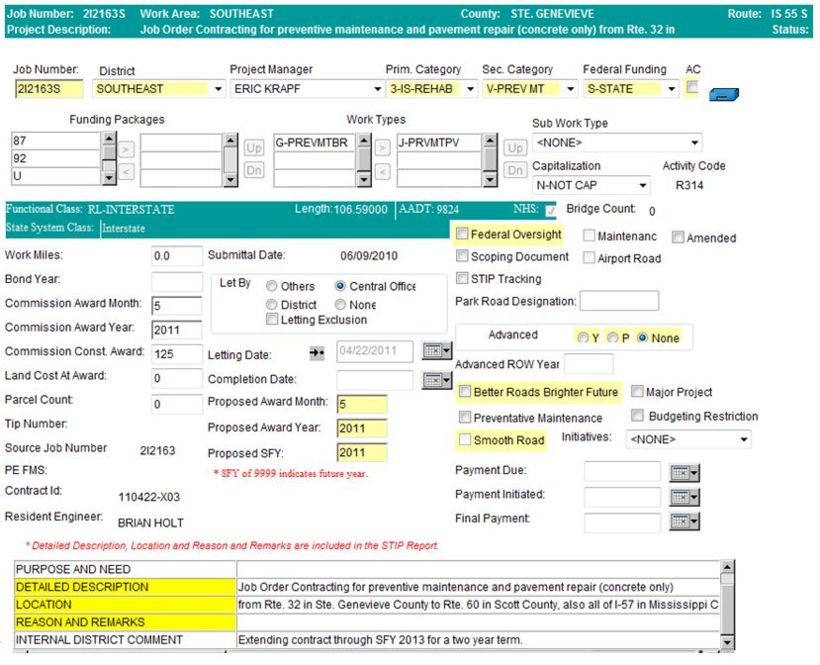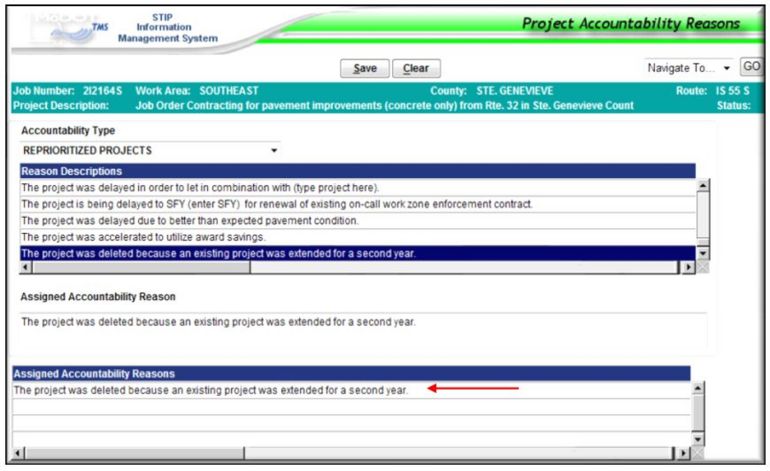147.3 Job Order Contracting (JOC)

MoDOT uses a procurement process called Job Order Contracting (JOC) for traditional on-call maintenance repair contracts, including asphalt and concrete pavement repair, guardrail and guard cable repair, bridge repair and fence repair. JOC allows MoDOT to award fixed price construction contracts with indefinite delivery and indefinite quantity at individual work locations throughout the project limits. The JOC bid proposals contain a catalog of pre-established fixed unit prices for material, equipment and labor for various items of work to be used for completing each job order. The contractor bids adjustment factors for the expected overhead and profit and any additional business and construction related costs for performing the various types of work identified in the contract. The fixed unit prices in the bid proposal allow the contractor to determine the adjustment factor (profit and overhead) that needs to be bid up front without knowing the quantities, schedules or timing of the work orders. Job Order Contracts are awarded based on the lowest responsive bidder. Overall, Job Order Contracting eliminates the ability for contractors to unbalance the bid.
The JOC bid proposal must specify the maximum program budget to be awarded during a specified contract term. MoDOT is not bound, however, to issue a minimum or maximum number of job orders during the contract term. It is MoDOT’s overall intent though to meet the anticipated budget specified in the contract.
| 2013 Job Order Contracting JSPs |
| Guardrail |
| Guard Cable |
| Fence |
| Concrete Pavement Repair |
| Bridge |
| Asphalt Pavement Repair |
| Contact Natalie Roark, Bidding and Contract Services Engineer, for additional guidance. |
147.3.1 Fixed Unit Price List
A fixed unit price list containing unit prices for the various items of work for each job order is included in the JOC bid proposal. Fixed unit prices are for complete and in-place construction, including all labor, equipment and material required to complete the construction task. All labor, material, equipment and work required by a specification shall be considered part of the fixed unit price, unless otherwise stated elsewhere in the contract.
147.3.2 Adjustment Factors
The contractor will bid three different Adjustment Factors:
- Normal Work Adjustment Factor - work conducted from 6:00 a.m. to 7:30 p.m. Monday through Friday
- Nighttime Work Adjustment Factor - work conducted from 7:30 p.m. to 6:00 a.m. Monday through Thursday
- Weekend Work Adjustment Factor - work conducted from 7:30 p.m. on Friday through 6:00 a.m. on Monday, night or day, or a holiday
Adjustment factors include business and construction related costs as defined below. It is the responsibility of the contractor to verify the fixed unit prices provided in the contract and to modify their bid for the adjustment factors accordingly.
Business Costs. Business related costs consist of profit, overhead costs, subcontractor profit and overhead, taxes, finance costs, and other costs including but not limited to;
- a. insurance, bonds and indemnification
- b. project meetings, training, management and supervision
- c. project office staff and equipment
- d. employee or subcontractor wage rates that exceed prevailing wages
- e. fringe benefits, payroll taxes, worker’s compensation, insurance costs and any other payment mandated by law in connection with labor that exceeds the labor rate allowances.
- f. business risks such as the risk of low than expected volumes of work, smaller than anticipated job orders, poor subcontractor performance, and inflation or material cost fluctuations.
Construction Costs. Construction related costs include but are not limited to;
- a. personnel safety equipment
- b. security requirements
- c. excess material waste
- d. daily and final clean-up
- e. costs resulting from inadequate supply of materials, fuel, electricity, or skilled labor
- f. costs resulting from productivity loss
- g. working in extreme and adverse weather conditions
- h. any other discreet items of work required to complete a particular job order.
General Costs. The above lists are not exhaustive and are intended to provide general examples of cost items to be included in the contractor’s Adjustment Factors as defined in the contract.
147.3.3 JOC Development: Job Special Provisions and Plan Sheets
MoDOT Bidding and Contract Services (BCS) conducts an annual internal MoDOT meeting to discuss lessons learned from previous year’s on-call contracts. Design staff incorporates changes into the next years contracts, and updates the job special provision (JSP) templates for distribution to the districts.
The BCS section also updates the fixed costs to reflect the new market value. In the event the costs change significantly, the BCS section coordinates with industry to ensure the fixed costs are satisfactory. The fixed costs in the draft proposals should not be adjusted by the districts, without prior input from the BCS section. It is important to have agreement on the fixed unit price list with industry to eliminate any outliers that could cause contractors to bid risk in the factors.
In addition, no additional items of work should be added without first coordinating with the BCS section. Our experience to date has shown that adding specialty items of work may discourage contractors from bidding on a typical maintenance contract because the specialty work has to be subcontracted out for additional costs. Many times, specialty items of work or items of work not identified in the list of fixed costs are better managed by negotiating a price with the JOC contractor. Establishment of pricing for any non-fixed cost pay items will be in accordance with Sec 109.4.2 or 109.4.3 of the Missouri Standard Specifications for Highway Construction. If no agreement to pricing can be made then the work will proceed with payment for non-fixed cost items under Sec 109.4.4.
The JOC contracts include contractor-furnished Traffic Control Plans (TCP) as on option, but the district may choose to provide the traffic control with MoDOT forces depending on availability.
Example TCP plans for the Job Order Contracts exist as seed files in ProjectWise. These example plans are based on what has been used on past contracts and are for example purposes only. Some of the traffic control scenarios may not apply to all districts so each district should ensure changes to the Traffic Control Plans are also changed in the JSP template. If there are revisions to the JSP template, the district should identify the revisions to the BCS section at the time of Plans, Specifications & Estimate (PS&E) submittal.
The JOC_TCP files are located at pw:\\ghpwise10:MoDOT\Documents\CADD_Standards\Standard Plans for Highway Construction\Job Order Contracting\.
All district ProjectWise users will have read-only access to the files.
The following is the process for obtaining a clean copy of all the files at one time:
- Select all of the files, right-click and select Copy.

- Then right-click in the job directory and select Paste.
147.3.4 Issuing Job Orders
The engineer will collaborate with the contractor when developing an individual job order. At any given time the contractor may be performing more than one job order.
The total cost of an individual job order will be determined by multiplying the fixed unit prices of each fixed cost pay item by the appropriate quantity and then multiplying the total cost of all pay items by the appropriate adjustment factor.
Example Job Order
| Item Description | Fixed Unit Price | Quantity | Price |
|---|---|---|---|
| SP125C (PG70-22) Per Ton (Over 1000 Tons) | $55.75 | 337.1 tons | $18,793.33 |
| SP190C (PG70-22) Per Ton (Over 1000 Tons) | $53.75 | 770.5 tons | $41,414.61 |
| Tack Coat | $3.40 | 180 gal | $612.00 |
| Mobilization – Coldmilling & Resurfacing (Over 1000 Tons) | $3,200.00 | 1 each | $3,200.00 |
| Milling Per SY (4 In. to 6 In. Thick) | $2.25 | 3520 sy | $7,920.00 |
| Subtotal: | $71,939.94 | ||
| Nighttime Work Factor | 1.200 | - | - |
| Subtotal: | $86,327.92 | ||
| Accelerated Repair | $2,500.00 | 1 each | $2,500.00 |
| TOTAL: | $88,827.92 | ||
| Note: The adjustment factor is not applied to Accelerated Repair because it is a lump sum cost for accelerated mobilization regardless of it being on a weekend or at night. | |||
147.3.5 Term Extension of Job Order Contracts
All JOC contracts include the option for a mutually agreeable one year term extension. The contract may be extended under the original terms and contract prices for a maximum contract term of two (2) years. The district should contact the BCS section by December 1 to evaluate and discuss whether the JOC should be renewed. Is the district satisfied with performance of the contractor? Are the existing bid prices reasonable? Is it the right business decision to renew the contract? If the option for extending the contract is exercised by MoDOT, a change order will be issued to extend the contract to the new term limits.
The following are the guidelines for extending the term of a Job Order Contract for an additional year for a maximum two year term.
- In order for the contract to be extended, the project must contain the language in the Term of Contract JSP that allows for a one year extension.
- If MoDOT desires to renew the contract, the contractor will be given written notification (e-mail is acceptable) of the extension no later than January 1 of the current contract year.
- The contractor shall provide written notification (e-mail is acceptable) of acceptance or rejection of the extension of the contract no later than February 1 of the current contract year.
- If the option for extending the contract is exercised by MoDOT, a no cost change order will be issued by MoDOT to extend the contract to the new term limits. The additional work for the term extension will be paid for as overruns.
- The RE must notify the contractor to renew the performance contract bond for 100% of the contract value for the renewal period.
- The district should notify the BCS section and Central Office (CO) Planning Programming staff by February 15 of the intent to extend the contracts and request CO Transportation Planning to delete the projects from the future STIP. The following information should be provided:
- a. Current project numbers being extended.
- b. Future project numbers in the STIP that will not be let because of extension.
- c. The source and funding split-out of each project. Indicate if SWIMB (Statewide Interstate and Major Bridge), district-funded or other FFOS.
- d. See below example.

- JOCs that will not be extended should be closed out in Site Manager at the end of the first year contract term.
- JOCs that are extended will be closed out in Site Manager at the end of the second year contract term. The district shall close out the contract following the Closing JOC Contracts guidelines below.
District Planning Managers should do the following in SIMS:
- For contract extensions, add the following message to the SIMS, Detail Screen - Internal District Comment field: “Extending Contract through SFY XXXX for a two-year term.”

147.3.6 Closing JOC Contracts
- Any JOCs that will not be extended should be closed out in Site Manager at the end of the first year contract term. Renewed contracts are closed out in Site Manager at the end of the second year contract term.
- Check the actual cost charges to make sure they are correct and request journal vouchers from Financial Services for corrections.
- Proceed with final close out in Site Manager.
- After close out of extended JOC contracts, enter the following standard reason for cost differences greater or less than 10% into SIMS, Project Accountability Reasons - Completed Projects section: “The cost estimate deviated from the actual cost due to this being a Job Order Contract that was extended for a maximum two-year term.”
147.3.7 Budget Adjustments for JOC Contracts
The contract budget adjustment will occur after the contract is complete.
- Interstate JOCs: If the contract is extended and an interstate project, Planning will credit the district with 2 years worth of Statewide Interstate and Major Bridge (SWIMB) funds rather than one year.
- Non-interstate JOCs: Contact Central Office Planning Programming managers because there may be specific issues regarding funding.
147.3.8 Deleted JOC Projects
If a JOC project is deleted, enter the following standard reason into SIMS, Project Accountability Reasons – Reprioritized Projects section: “The project was deleted because an existing project was extended for a second year.”
